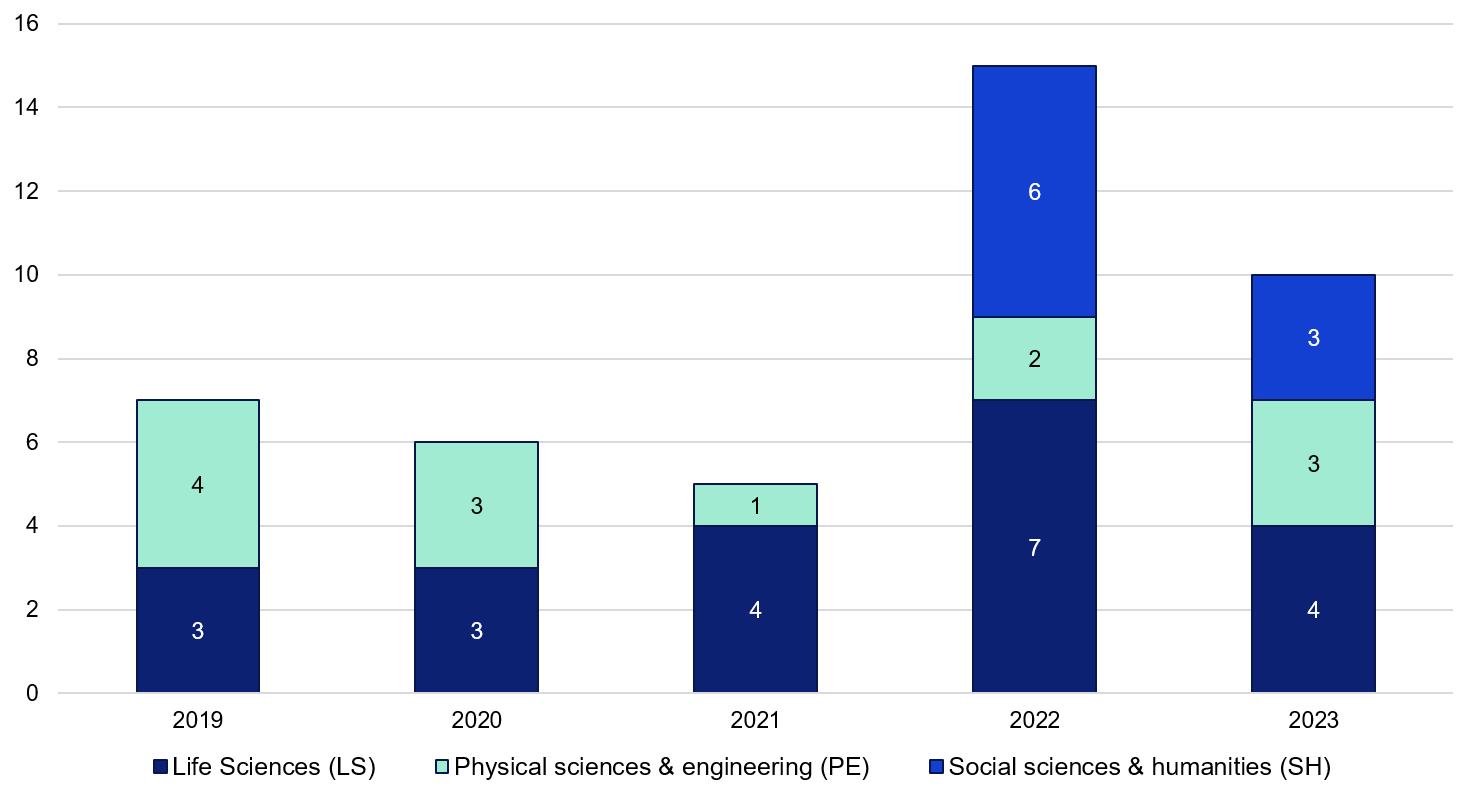News
News
PublISHED ON
UpDATED ON
10 researchers in Sweden to receive an ERC Advanced Grant 2023
The ERC has published the results of last years call for ERC Advanced Grant. 255 researchers from 20 different countries are awarded the grant. 10 of them are affiliated to a Swedish host institution.
ERC Advanced Grant is intended for active researchers who have a track-record of significant research achievements in the last ten years, and the average grant is 2,5 million EUR. Under the call 2023, 255 researchers from 20 countries will share 652 million EUR.
Among the 10 researchers in Sweden receiving ERC Advanced Grant, 4 are active within life sciences, 3 within social sciences and humanitites and 3 within physical sciences and engineering.
ERC recieved 1 829 applications. The approval rate was 14 percent.
"We can observe an increase in Swedish researchers within humanities and social sciences who are applying for and succeeding in the competition for an ERC Advanced Grant. A special congratulations to the Stockholm School of Economics, which has received funding for the first time,” says Stefan Svallfors, Secretary General for Humanities and Social Sciences at the Swedish Research Council.
Approved research projects
Chalmers University of Technology
- Jan Stake with the project FIRE: Far-infrared semiconductor electronics
Stockholm School of Economics
- Alexander Ljungqvist with the project Investibility: The Shrinking Stock Market, Investibility, and Creative Destruction
Karolinska institutet
- Nils-Göran Larsson with the project TransMit: Mutations of mtDNA - inheriting without perishing
- Abdel El Manira with the project Ensembles: Brainstem circuit ensembles for movement flexibility
- Juleen Zierath with the project CIRCAMET: Circadian Control of Systemic Metabolism in Physiology and Type 2 Diabetes
KTH Royal Institute of Technology
- Mats Danielsson with the project Si3: 3D silicon detector for imaging of diagnostic and therapeutic nuclear medicine radiotracers with outstanding efficiency and high spatial resolution.
Lund University
- Raimund Muscheler with the project PastSolarStorms: Past Solar Storms: The links between solar storms and solar activity
- Thomas Pugh with the project Tree2Globe: Global reanalysis for a forest carbon sink in flux
Institute for Futures Studies
- Jan Jonsson with the project IneQint: Inequality and Integration
Uppsala university
- Don Kulick with the project NOTREALLYTHERE: People Who Aren’t Really There: ‘Non-persons’ as a field of scholarly inquiry
The ERC website has more statistics and a list of all the grant recipients External link.
External link.
Sweden and ERC Advanced Grant over time
Over the last five years, 43 researchers affiliated to a Swedish host institution have received an ERC Advanced Grant.

Number of grants awarded per subject area and year. Source: ERC
Year | Life Sciences (LS) | Physical sciences & engineering (PE) | Social Sciences & Humanities (SH) |
|---|---|---|---|
2019 | 3 | 4 | |
2020 | 3 | 3 | |
2021 | 4 | 1 | |
2022 | 7 | 2 | 6 |
2023 | 4 | 3 | 3 |
Total | 21 | 13 | 9 |
The Swedish Research Council and ERC
The Swedish Research Council works to encourage more researchers in Sweden to apply for and be awarded ERC grants. Some of our work consists of arranging interview training for researchers who have been selected for stage 2 of the application process. We also organise webinars with information about upcoming ERC calls.
22 of April: ERC Starting och Consolidator Grant webinar
If you have questions, please contact Anethe Mansén, national contact point (NCP) for ERC: anethe.mansen@vr.se
MORE WITHIN THE SAME SUBJECT AREA
-
Activity |
Published 20 March 2024
The Swedish Research Council is organising a workshop series for European Research Council (ERC) Starting Grant step 2 candidates to obtain advice and inspiration for the interview with the ERC panel. Target group is Reseachers that have applied with...
-
News |
Published 14 March 2024
The Nordic countries have teamed up with Canada and the USA to launch a NordForsk call on the sustainable development of the Arctic. The Swedish Research Council is one of the funders. The deadline for pre-proposals is 4 June 2024.
-
News |
Published 15 February 2024
It is now possible for researchers who applied for the grant Post Doctoral European Fellowship 2023 within Marie Sklodowska-Curie Actions (MSCA) programme, and were the highest ranked reserves, to receive funding from the Swedish Research Council. Th...





